Calls For Mass Protests Against Iran Regime Next Week Gains Momentum

Calls for mass protests on February 20 is gaining momentum outside Iran with several key figures are asking compatriots to stage anti-regime protests.

Calls for mass protests on February 20 is gaining momentum outside Iran with several key figures are asking compatriots to stage anti-regime protests.
Alireza Akhundi and Darya Safai, two representatives of Iranian origin in the parliaments of Sweden and Belgium called on Iranians to gather in front of the European Council building in Brussels Monday and support the inclusion of the IRGC in the list of terrorist organizations in the European Union.
Activists Masih Alinejad and Hamed Esmaeilion also welcomed the call saying that they will participate in the February 20 gathering of Iranians in Brussels to support the designation of the IRGC as a terrorist in the European Union.
Meanwhile, people inside Iran chanted anti-government slogans in Karaj, west of Tehran, and different neighborhoods of capital Tehran, as in previous months.
They also distributed flyers to invite people to participate in a protest rally on Thursday.
Thursday marks the 40th day after the execution of Mohammad Hosseini and Mohammad Mehdi Karami.
The two young men, who were arrested during the protests in Karaj, were executed without having access to fair trial and lawyers.
Street protests, gatherings, overnight slogans, writing graffiti and other forms of civil disobedience are still going on inside and outside the country, five months into the uprising against the clerical rulers.
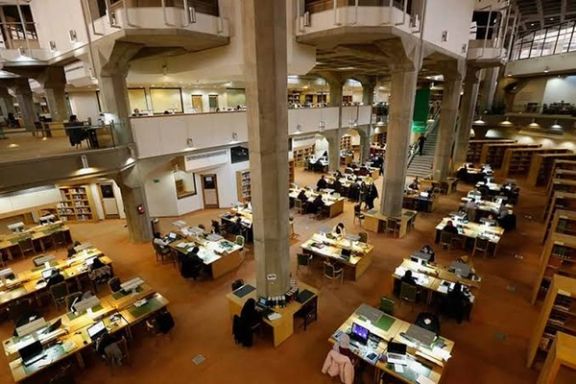
Some members of the National Library of Iran have protested the suspension of several female members for not complying with the "mandatory hijab".
In a statement Monday, they called such decisions an escalation of "gender apartheid" by the Islamic Republic.
The National Library sent text messages to a number of female members last week to inform them their membership has been suspended due to having improper hijab.
The protesting members stated that after the "baton and bullet policy", the Islamic Republic has taken a "soft removal policy" against women.
Earlier "the task of suppressing and eliminating women who oppose the mandatory hijab was carried out by the military and security forces", but now "the National Library Organization has also taken steps to exclude women,” reads the statement.
In the last few weeks, numerous reports have also been published about police sealing off businesses, restaurants, cafes and even in some cases pharmacies for not observing the mandatory hijab rules by their employees.
As street protests have ebbed, hardliner clerics and hardcore regime supporters have once again started demanding a strict enforcement of hijab rules.
The regime has already increased pressure on women for non-compliance with the mandatory hijab in a situation that the country has been the scene of nationwide protests since September 16, following the death of Mahsa Amini in police custody for not wearing ‘proper hijab’.
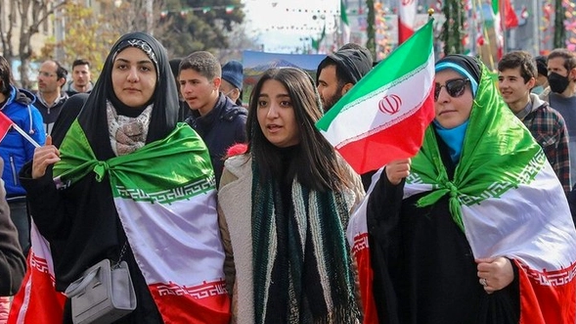
Protests planned for February 16 may be a test for finding out a change in the Iranian government's approach to address dissent.
Following more than five months of protests, numerous calls made by Iranian politicians from across the spectrum to do away with violent crackdown, finally prompted the government to reluctantly announce a partial amnesty for jailed protesters and promises to release more prisoners including intellectuals.
However, a call for protests on February 16 has been made on social media and many Iranians have called on businesses in Tehran and other Iranian cities to shut down the CC-cameras that might be used by security forces to identify protesters.
The call for the protest came on the anniversary of the 1979 revolution on February 11 when the Iranian government rallied its supporters and reportedly forced some government officials and students to take part in the rallies.
Many politicians and pundits in Tehran have voiced guarded praise for the partial prisoner amnesty, but they have also called on the clerical regime to be more tolerant of protests to regain some of its lost legitimacy.
Government officials and state-owned media presented conflicting and exaggerated figures for the number of those who took to the street in the stage-managed rallies. Asr Iran website in Tehran featured a report questioning the validity of these numbers, adding that exaggerated figures could be counter-productive and insulting.
Like Fars news agency, hardliner daily Kayhan put the number of those taking part in the rallies at 20 million and called it the highest figure in 44 years. Asr Iran argued that the figure is unbelievable, just as the 2010 number of 50 million, which was too exaggerated for a country with a population of just over 75 million at the time.
Asr Iran noted that a comparison of the figures for 2010 and 2023 shows that some 30 million Iranians are no longer interested in taking part in the pro-government rallies. It called such fabricated news as treason, although it said that "millions" of Iranians were present in the rallies but did not cite an exact number.
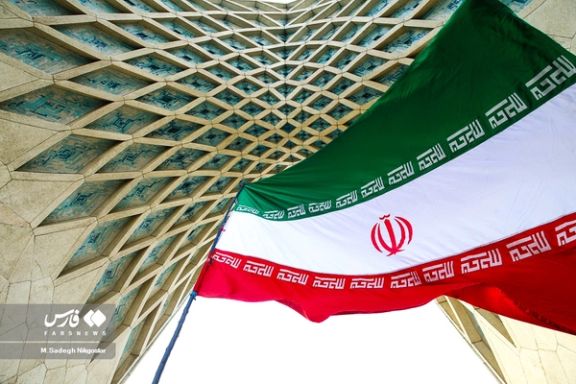
Asr Iran warned that whatever the figures, the people's presence does not necessarily mean that they are happy about the government's performance. Furthermore, their presence should not prompt the government to ignore the absence of a larger number of people who chose not to take part in the rally. The website quoted Iran’s ruler Ali Khamenei as saying, "They may not like the Islamic Republic, but they certainly like Iran."
The website also said that the protests during the past months gave an added motivation to government supporters to take part in the demonstrations. In fact, this was what some Iranians told the state television in stage-managed interviews that were broadcast throughout the day on Saturday.
Asr Iran added that it was foolish to doctor photos to portray the number of pro-government demonstrators more than their actual numbers.
Media in Tehran generally ignored massive rallies by Iranian expats in Washington DC, Los Angeles, Chicago, Paris, London, and several other European and Australian cities. However, it suggested that Iranian officials should keep monitoring the number of people who take part in progovernment demonstrations in Iran.
In another development, welcoming the amnesty for political prisoners, centrist daily Ham Mihan wrote on Sunday that "The amnesty and the promise of further pardons were good news, but "There will be no essential change in this regard as long as foreign-based media remain as the point of reference for Iranians." Ham Mihan added, "This requires the overhaul of the media as an institution. The media should be taken out of the war of narratives and returned to the arena of reflecting the truth."
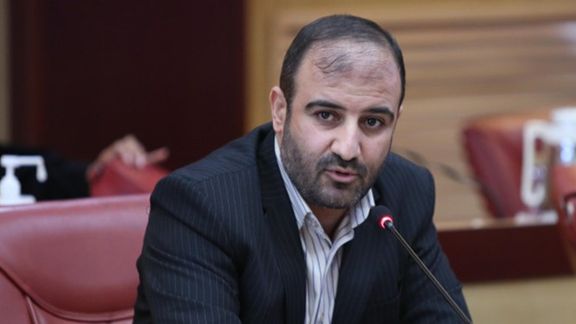
Despite numerous reports on the dismissal of university professors for supporting protests, an Iranian official claims, "no professor has been dismissed due to political issues".
Morteza Farrokhi, the Legal Deputy of Science Ministry, told ISNA Monday that "if there are any cases of dismissal, it has been due to their academic incompetence."
This comes as there had been numerous reports about the suspension or dismissal of dozens of professors from universities across the country in the past months.
The latest case was Hasan Baqerinia, a professor at Hakim Sabzevari University, who was dismissed for supporting the protests following the death of Mahsa Amini in police custody in September.
On February 4, he announced on his Instagram that the security forces are threatening him.
Before that, Amir Maziar, a faculty member of Tehran University's Faculty of Theoretical Sciences and Advanced Art Studies, announced his suspension as well as the suspension of another professor of the university, Kourosh Golnari.
Iranian media reported in early February that nine professors of Tehran Azad University have been forced into early retirement because of expressing critical views against the Islamic Republic.
Moderate news website Rouydad 24 has quoted Susan Safaverdi, one of the professors as saying that they were expelled because they were not “revolutionary”.
She further noted that she and the eight others, who are expelled on the pretext of reaching the retirement age, have been repeatedly accused of being “anti-establishment”.
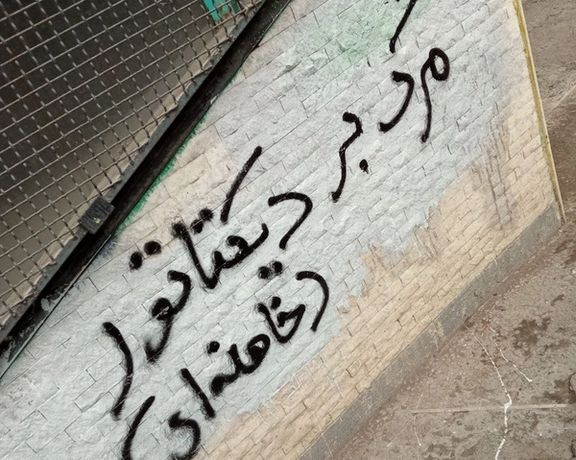
Groups of Iranian reformist politicians and activists have come out in support of their top dissident figure against the Islamic Republic, demanding a referendum.
Over 400 political activists and journalists have signed a statement in support of Green Movement leader Mir-Hossein Mousavi’s call to end clerical rule in Iran.
“With the current social awakening, and the society’s disillusionment with reforms within the current [political] structure, there is no other way than allowing the people to decide their own destiny,” the statement said while expressing its support of Mousavi’s three-stage proposal and a “peaceful and non-violent transition” to a democratic government and the “Woman, Life, Freedom” Movement.
Mousavi, who was a presidential candidate in 2009 and has been under house arrest since 2011, said in a statement on February 4 that fundamental change was required to “save Iran” and proposed elections to appoint a constitutional assembly to write a new constitution and a referendum on the new constitution and its proposed form of government.
The statement which was released Sunday said the outcome of a political structure based on the rule of Islamic clerics, after four decades is corruption and injustice, a government that is structurally incapable of dealing with an array of crises, and social and political freedoms that have been suppressed.
In another statement, 112 reformists who are mostly former government officials, issued a similar statement Sunday admitting the goals of the 1979 revolution to have justice and democracy in Iran have failed, and voiced support for Mousavi’s demands.
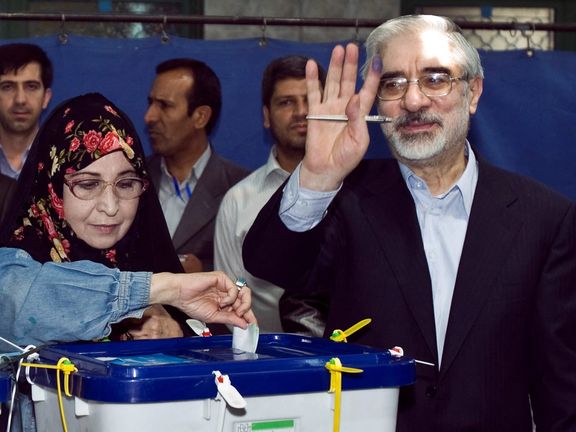
In the current atmosphere the support for Mousavi and his demand for transition from the Islamic Republic could entail serious repercussions for its signatories, who had so far remained loyal to the Islamic Republic.
It can also be a serious set back for the regime, as its opponents have begun uniting and organizing in the diaspora, while it is losing its traditional power base.
In 2009 Mousavi’s refusal to accept the results of the election sparked widespread protests that were brutally suppressed after Supreme Leader Ali Khamenei accused him of “sedition” along with former parliament speaker Mehdi Karrubi, another candidate in the same elections, and former president Mohammad Khatami.
The signatories of the statement include many of Mousavi’s former supporters and other reformists including Hashem Aghajari, a reformist politician who in 2000 was sentenced to death (later commuted) for “disrespecting Islam and Islamic sanctities” in a speech, and politicians such as Abolfazl Ghadyani who has been a harsh critic of Khamenei in the past decade.
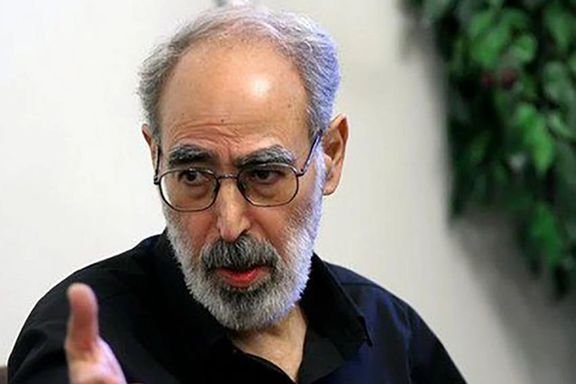
Among the signatories there are also women’s rights activists such as Noushin Ahmadi-Khorasani who was among the founding members of the One Million Signatures campaign, former student activists such as Abdollah Momeni who has been jailed several times in the past two decades, and veteran journalists such as Mashallah Shamsolvaezin who founded several popular reformist newspapers including Jame’e (Society) from 1998 onward.
Mousavi’s proposal has found support with some others including the prominent Baluch cleric Mowlavi Abdolhamid Esmail-Zehi, and leading reformist politicians Mostafa Tajzadeh and Faezeh Hashemi, the daughter of Iran’s former president Akbar Hashemi-Rafsanjani, both of whom are behind bars.
In a statement issued with five other political prisoners last week, Tajzadeh and Hashemi said “the only way out of the impasse for the government is to surrender to the right of the people to determine their own destiny.”
Tens of expatriate “Republican” figures and activists in a separate statement on Friday called Mousavi’s proposal “a positive and forward-looking proposal towards strengthening solidarity among the rainbow political atmosphere of Iranians seeking a transition from the Islamic Republic”.
Iran newspaper, the mouthpiece of the government, on Sunday mocked Mousavi’s proposed elections and referendum and said his record already included “insurgency against the republic during the 2009 sedition” while the semi-official Mehr News Agency in a commentary on the same day claimed that his statement proved again his “hostility” at a time when unrest in the country has subsided.
Karrubi has so far not made any comments about transition from the Islamic Republic but Khatami in a statement last week, a day after Mousavi’s declaration, called on the government to meet the people's demands and prevent a revolutionary change.
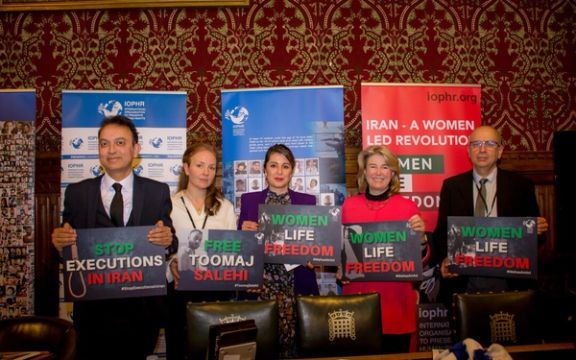
The United Nations Special Rapporteur on human rights in Iran has called for tangible measures to hold the Islamic Republic accountable for its violations.
Javaid Rehman made the remarks during an event held by the International Organization to Preserve Human Rights (IOPHR), a London-based think tank which promotes equality, inclusivity and social development and is currently focusing on the Islamic Republic. The meeting, titled “How to stop the global threat of the Iranian regime,” was held at the UK’s House of Commons on February 8, in which participants discussed how the UK government could support anti-regime protesters.
Rehman, who has repeatedly condemned the Islamic Republic over its rights violations, has intensified his rhetoric and tone about holding Tehran accountable over its violent crackdown on protests that have convulsed the country since mid-September. The clerical regime has killed over 500 people to say that it did not kill 22-year-old Mahsa Amini who was fatally injured after being arrested by the notorious ‘hijab police’.
In a strongly worded speech, Rehman called for the international community to take more action against Iranian officials through available legal means in order to bring them to account and condemned the brutality of the Iranian state, which he described as “a threat to regional and international security.”
He said that “the manner in which the Iranian regime handled these protests is heart-wrenching and painful to elaborate,” adding “I am horrified, shocked and outraged.”
Despite all the international measures and calls for restraint, “the Iranian authorities have thus far executed at least four persons associated with the protests. They’ve been tried arbitrarily, summarily and through sham trials which violate the right to fair trials and due process,” he noted.
Calling Iran’s level of executions and its use against minorities “deplorable,” he said, “These executions are used as a tool of repression to instill fear, and these are symbols of Iranian state brutality.” These executions are” a tool that the regime adopts in order to terrorize its own people as well as foreign and dual nationals.”

Calling Iran’s level of executions and its use against minorities “deplorable,” he said, “These executions are used as a tool of repression to instill fear, and these are symbols of Iranian state brutality.” These executions are” a tool that the regime adopts in order to terrorize its own people as well as foreign and dual nationals.”
Answering a question from Iran International’s Adam Baillie about measures against the IRGC, Prof. Rehman said that for him the big question was holding the IRGC accountable for crimes it may have committed, such as the shooting down of a Ukrainian airline in January 2020.
Rehman also decried the regime’s hostage-taking policy, noting that “such instrumentalization of individuals amounts to hostage taking and must be recognized as such. And all those involved in acts of hostage taking must be held accountable.”
He argued that there are legal means to prosecute Iranian individuals incriminated in human rights abuses over and above sanctions, pointing out that many Iranian officials who are human rights violators are at liberty in London while persecuting their countrymen at home. “What we see is that there are many human rights violators roaming around London without accountability, they have assets which they use, they have families which enjoy those benefits and yet they cherish, see and enjoy targeting and victimizing people back home, which should not happen.”
He also expressed abhorrence of Tehran’s threats and harassment of journalists abroad and called for technology companies to make online communication tools available to the Iranian people. “In order to achieve its agenda of threats and generating fear, the Iranian regime actively blocks information,” he said, slamming severe internet disruption and censorship of social media platforms.
Noting that the Iranian regime violates human dignity and respect for women with impunity, he said that “the law of enforcement of hijab and the manner of its enforcement by state authorities is emblematic of violence, brutality and violations of the fundamental human rights.”
“The international community and the United Kingdom cannot engage with a state which continues to violate the dignity and fundamental rights of its own people, in particular its children,” Rehman underlined.
He added, “I believe there are so many avenues...it may not be obvious to us, but we have to find ways to hold individuals accountable, including people right at the top. And this must be done to ensure justice. And while I appreciate all the efforts being done, including sanctions, I think ultimately accountability would mean a lot more to the people of Iran.”